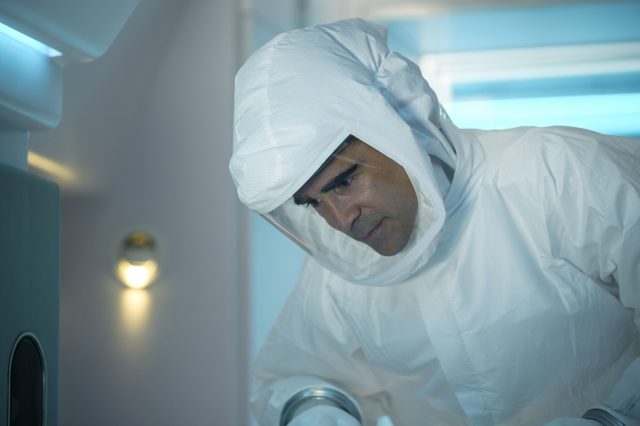Voyagers: Preprogrammed, by David Bax

Each of the young men and women on board the massive spaceship in Neil Burger’s Voyagers (not counting chaperone/father figure Richard, played by Colin Farrell) has been trained for their crucial mission since birth. Their top flight education is self-evident; they are confident and capable and, even when they start brutalizing one another, they do so while bandying about clever wordplay. Basically, Burger has gone to great lengths to convince you of how smart these characters are, which is at odds with the fact that the movie itself is so stupid.
In the somewhat near future, a planet that will offer mankind escape from the one we’re currently poisoning into inhabitability is discovered. The problem is that it takes nearly a century to get there. So scientists led by Richard grow new astronauts in a lab, never exposing them to the outdoors or to anything that will lead them to form an attachment to Earth. In their teens, they set off on their voyage with everything–down to when and how they will create the next generation–planned out for them. The main action picks up ten years into the trip when some of the kids–now in their twenties–discover that their morning beverages include hormone suppressants and decide to stop drinking them. All hell breaks loose, except in the most predictable way possible.
Bafflingly, Burger seems to have no interest in interrogating the ethical affronts suggested by his premise. We learn early on that eugenics was employed to create the band of space explorers to begin with. Add to that the inhuman limits and expectations of their upbringing and you ought to have a volatile mixture. But Voyagers offers no implications that its later developments are the result of these characters being particularly predisposed to violence. That would complicate the film’s high school book report interpretation of Lord of the Flies.
Before Voyagers comes to rest on the shallow bottom of its imagination, though, it starts off with promise. With Trevor Gureckis’ paranoid score of alternating drones and ticks, there’s an almost horror movie tone of dread. The characters seem to feel that something’s about to go wrong before they have any clue as to what that might be.
And then, once the first few (including Tye Sheridan’s Christopher and Fionn Whitehead’s Zac) stopping taking their secret medication, Voyagers shows a burst of feeling. That can actually be taken literally, as their increased sensitivity leads them to explore both physical pleasure (furtive dry humping) and pain (intentionally shocking themselves) with equal curiosity. Eventually there’s a whole ship full of hot, horny and aggrieved young people; humanity in all its messiness has finally been introduced to the pristine, white corridors and surfaces of the ship.
It’s at this exact point, as if the movie is frightened of its own sense of danger, that the film devolves into formula. The clean moral divide, the alignment into camps and the big showdown at the end all feel like they could have been spit out by one of the ship’s computer programs; there’s even a quest to unlock a secret room that feels like it’s right out of a video game. Voyagers gives us a future that’s already been written.


























